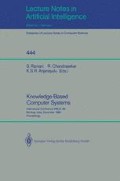Abstract
This paper argues that computer systems can be classified according to the relative amounts of cognitive processing that are required from the human user and the system software, and that co-operativity takes different forms in these different classes of systems. It proposes a generic architecture for the class of systems in which cognitive processing is interactively shared between computer and user, and argues that in an important sub-class of systems, much of what is normally understood by ”user-modelling” is unnecessary to provide co-operative responses to questions.
Preview
Unable to display preview. Download preview PDF.
References
Allen J and Perrault PC. Analysing intention in utterances. Artificial Intelligence, 15, pp. 143–178, 1980.
Allport D, A Parser for “Help File English”. MSc Thesis, Sussex University, 1983.
Allport D and Kidd A. Using Knowledge about Search Space to Give Co-operative Responses. Paper submitted to Theoretical Aspects of Reasoning about Knowledge Conference 1990 (forthcoming).
Burton RR and Brown JS. Multiple Representations of Knowledge for Tutorial Reasoning. In Bobrow DG and Collins A (eds), Representation and Understanding. Academic Press, New York, 1975.
Cohen PR and Levesque HJ. Persistence, Intention and Commitment. Technical Note 415, SRI International, 1987.
Finin T and Morris G. Abductive Reasoning in Multiple Fault Diagnosis. Technical Report, Unisys, Paoli PA, 1988.
Frohlich DM and Luff P. Conversational Resources for Situated Action, Paper submitted to CHI 90 (forthcoming).
Hirschberg J. Anticipating False Implicatures: Co-operative Responses in Question-answering System. In Kerschberg L (ed), Expert Database Systems. Benjamin Cummings Publishing Co Inc, 1986.
Kaplan SJ. Co-operative Responses from Portable Natural Language Database Query System. In Brady M (ed), Computational Models of Discourse. MIT Press, 1982.
Kidd AL. What do Users Ask? Some Thoughts on Diagnostic Advice. In Merry M (ed), Expert Systems '85. Cambridge University Press, 1985.
Motro A. Query Generalisation: a Method for Interpreting Null Answers. In Kerschberg L (ed), Expert Database Systems. Benjamin Cummings Publishing Co Inc, 1986.
Pollack ME. Good Answers to Bad Questions: Goal Inference in Expert Advicegiving. In Proceedings of the Fifth Biennial Conference of the Canadian Society for Computational Studies of Intelligence, London, Ontario, 1984.
Power R. The Organisation of Purposeful Dialogues. Linguistics, 17, pp. 107–152, 1979.
Robinson P, Luff P and Jirotka M, Hardey M, Gilbert GN, Frohlich DM, Cordingley B and Buckland S. Functional Specification for the Advice System. University of Surrey, 1988. Technical Report, Alvey DHSS Demonstrator Project.
Sanchez M and Joseph A. Piano Tutor Project: a State-of-the-art Approach to Piano Teaching. In Proceedings of the Computers in Music Research Conference. University of Lancaster, 1988.
Sleeman D. Assessing Aspects of Competence in Basic Algebra. In Sleeman D and Brown JS (Eds) Intelligent Tutoring Systems, Academic Press, 1982.
Author information
Authors and Affiliations
Editor information
Rights and permissions
Copyright information
© 1990 Springer-Verlag Berlin Heidelberg
About this paper
Cite this paper
Allport, D. (1990). A computational architecture for co-operative systems. In: Ramani, S., Chandrasekar, R., Anjaneyulu, K.S.R. (eds) Knowledge Based Computer Systems. KBCS 1989. Lecture Notes in Computer Science, vol 444. Springer, Berlin, Heidelberg. https://doi.org/10.1007/BFb0018364
Download citation
DOI: https://doi.org/10.1007/BFb0018364
Published:
Publisher Name: Springer, Berlin, Heidelberg
Print ISBN: 978-3-540-52850-0
Online ISBN: 978-3-540-47168-4
eBook Packages: Springer Book Archive

